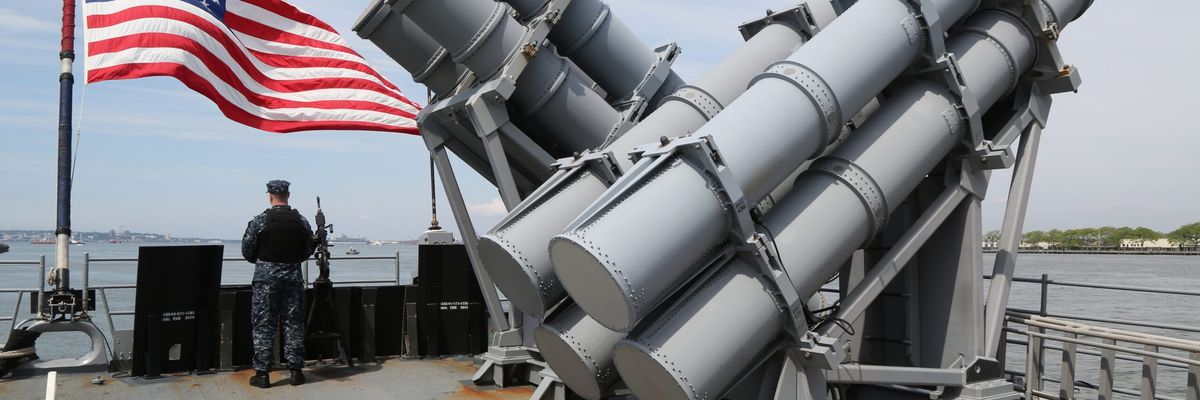U.S.-trained Ukrainian soldiers sank two Russian ships in June, according to Bill LaPlante, the Pentagon’s top acquisitions official. The incident came just two months after Washington gave Ukraine intelligence that helped it sink the Moskva, then Russia’s most powerful warship in the Black Sea.
Washington trained the combatants on how to use Harpoon anti-ship missiles over Memorial Day weekend earlier this year. “The next week, two Russian ships were sunk,” LaPlante said during an interview with Defense News.
The revelation emerged less than a week after news broke that Washington conducted war games with Kyiv in order to plan for its counter-offensive in Kherson, highlighting the close operational ties between the U.S. and Ukrainian militaries. The news adds to concerns that the United States is engaged in a full-scale proxy war with Russia, as Kelley Vlahos recently argued in Responsible Statecraft.
“As usual it appears that the administration wants to have it both ways: assure the American people that it is being ‘restrained’ and that we are not ‘at war’ with the Russians, but doing everything but planting a U.S. soldier and a flag inside Ukraine,” Vlahos wrote.
Experts say that such a proxy conflict brings up two concerns. The first is that the United States will be incentivized to draw out the conflict for as long as possible in order to maximize their damage to Russia’s strategic interests.
“Proxy wars are longstanding tools of great-power rivalry because they allow one side to bleed the other without a direct clash of arms,” Hal Brands of the American Enterprise Institute wrote back in May. “The key to the strategy is to find a committed local partner — a proxy willing to do the killing and dying — and then load it up with the arms, money and intelligence needed to inflict shattering blows on a vulnerable rival.” (Brands, who favors this approach, warned that the U.S. would be better served if it carried out such a strategy more quietly.)
This is especially worrying given the recent news that former British Prime Minister Boris Johnson, then a key figure in the Western coalition to support Ukraine, likely helped spike a peace deal back in April. Simply put, there’s little reason for Western leaders to encourage Moscow and Kyiv to negotiate an end to the war if they’re convinced that prolonging the conflict will help “bleed” Russia.
The second concern is perhaps the most significant: the risk of escalation to full-blown war between the U.S. and Russia. Washington already has CIA operatives in Ukraine and special operations forces nearby, and the obvious closeness of U.S. cooperation with Ukrainian forces could at some point convince Russian President Vladimir Putin that America is a true belligerent in the war.
“If the United States and NATO seek Russia’s unconditional defeat by unconventional means — proxy and economic warfare — can we reasonably expect Moscow to acquiesce to terms of indirect conflict that play to our strengths?” wrote George Beebe of the Quincy Institute in Responsible Statecraft in April. “How long will Moscow refrain from direct retaliation against the West, particularly if the Russian operation in Donbass starts to falter?”
In the meantime, Moscow’s operations in the Donbass have started to falter, but it seems unlikely that Washington will heed Beebe’s warning. Just a few days ago, the White House announced that it wants Congress to approve another $7 billion in military aid for Ukraine, on top of the nearly $13 billion in lethal assistance that the U.S. has already provided. That money signals that Washington continues to have its eye on the battlefield instead of the negotiating table.
















